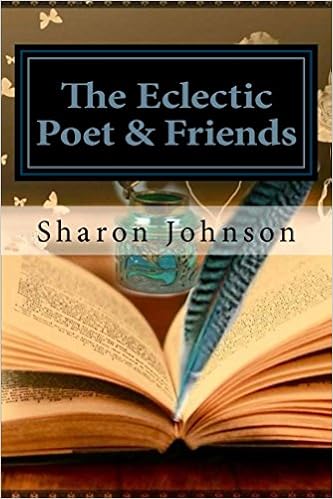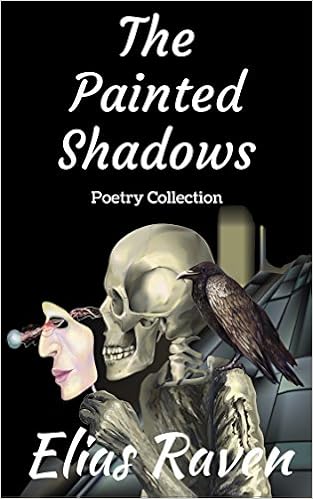Say hello to the suave, daring, enigmatic Elias Raven, a musician, lover, cook, all-around bon vivant and author of intensely erotic fiction. He would not reveal his head shot to us (or to anyone for that matter), but he was kind enough to open up about the real life inspiration behind some of his most erotically charged passages
MJN: You have an impressive biography outlining
your accomplishments in the areas of music, literature and world cuisine, yet I
could not find a single head shot of yours. Is that omission
deliberate? Do you feel it adds mystique?
ER: It does add to the
mystique, but a lot of authors that are using nom de plumes don't always put up
pictures of themselves for a variety of reasons. Mine is family related with my
family being very religious. One brother is a deacon in the church, another is
a faith healer, and the others hold a position of power that my choice of
profession might cause some embarrassment to them, so I opted for this route.
In addition, Facebook's facial recognition software doesn't add to one's
feeling of security, knowing that even partial shots can be used to reconstruct
your image. There are a lot of other authors that choose to remain anonymous,
some more famous then me. J.K. Rowling has a nom de plume she uses including a
man's name: Robert Galbraith. There is also Stephen King and his alias Richard
Bachman. And the famous author James Joyce and Herman Melville all come to
mind. I included the headline from The Sunday Times below when the news broke
of J.K. Rowling's nom de plume being exposed...
"This past Sunday The Sunday Times broke the news that Robert Galbraith, the author of the crime book The Cukoo's Calling, is actually the nom de plume of Harry Potter author J. K. Rowling. Rowling expressed regret that her identity had not remained a secret a bit longer, calling it "wonderful to publish without hype or expectation."
MJN: Not long ago I interviewed N.J. Salupo, another male author of erotica - a genre that seems to be dominated by women. I am going to ask the same question I asked N.J. Do you believe that erotica written by men has a different edge to it? Even in the 21st century, when nothing is forbidden, and no proverbial stone has been left unturned, there is a lot of miscommunication between the sexes regarding what each party finds appealing in bed.
ER: I do believe erotica written by men has a different edge to it. The erotica books that I have read by women have a different flavor to them, but at the same time, the writing is spectacular. I was blessed to actually have a female author help me learn the ropes, so to speak, on writing erotic fiction (Gina Whitney). Part of what I do when I write my book(s) is I have a lot of alpha and beta readers that provide me continuous feedback as I go through the writing process. If I get something wrong or something that doesn't work we usually have a round table about it. I use the feedback as a way to write the best possible novel or novella that I can and having so much real time input is really a blessing for me as an up and coming author.
"This past Sunday The Sunday Times broke the news that Robert Galbraith, the author of the crime book The Cukoo's Calling, is actually the nom de plume of Harry Potter author J. K. Rowling. Rowling expressed regret that her identity had not remained a secret a bit longer, calling it "wonderful to publish without hype or expectation."
MJN: Not long ago I interviewed N.J. Salupo, another male author of erotica - a genre that seems to be dominated by women. I am going to ask the same question I asked N.J. Do you believe that erotica written by men has a different edge to it? Even in the 21st century, when nothing is forbidden, and no proverbial stone has been left unturned, there is a lot of miscommunication between the sexes regarding what each party finds appealing in bed.
ER: I do believe erotica written by men has a different edge to it. The erotica books that I have read by women have a different flavor to them, but at the same time, the writing is spectacular. I was blessed to actually have a female author help me learn the ropes, so to speak, on writing erotic fiction (Gina Whitney). Part of what I do when I write my book(s) is I have a lot of alpha and beta readers that provide me continuous feedback as I go through the writing process. If I get something wrong or something that doesn't work we usually have a round table about it. I use the feedback as a way to write the best possible novel or novella that I can and having so much real time input is really a blessing for me as an up and coming author.
MJN: For me as a novelist, writing sex scenes is
very challenging, because I only have my own experience to lean on, and I come
from a place of tremendous insecurity, inhibition and dysfunction. (Too much
information, I know). And yet, I've been complimented on my candor. The love
scenes penned by me would fall into the category of "anti-erotica".
When you write steamy scenes, do you lean on your own experience or on the
commonly accepted fantasies that readers expect from erotic films and books?
ER: Actually, to be honest a
lot of my writing (not all) does come from my own experiences. I was married
for some time, and after my wife and I split up, I went on a journey of self
discovery and learning. This included exploring the (BDSM) club scene in
Hollywood and engaging with a partner that was a switch for about a year and a
half. I also had a lover that was an older women that had studied Kundalini
Yoga and Tantric Sexual Practices among other things that really opened my mind
and body to a lot of possibilities. I always tried to keep an open mind, and I
think in the end all those experiences have made me a much better lover then I
was before. I try to write what I find erotic and appealing and convey
the images via the written word to my readers to stimulate and entice.
MJN: When you wrote Cain -Sins of the Fathers, how heavily did you lean on the Biblical archetypes?
ER: The original idea for Cain was based on Cain and Abel. I studied extensively the canonical and non-canonical texts as well as many of the books that are not approved by the traditional religious institutions. As I studied and started creating the story, I tried to keep my characters updated, yet tied to the past. I think the whole became a successful fusion of ideas that formed into a cohesive story that is both engaging and exhilarating. You will see familiar and non-familiar characters in my novels. That is the beauty of creating a world from your imagination.
MJN: When you wrote Cain -Sins of the Fathers, how heavily did you lean on the Biblical archetypes?
ER: The original idea for Cain was based on Cain and Abel. I studied extensively the canonical and non-canonical texts as well as many of the books that are not approved by the traditional religious institutions. As I studied and started creating the story, I tried to keep my characters updated, yet tied to the past. I think the whole became a successful fusion of ideas that formed into a cohesive story that is both engaging and exhilarating. You will see familiar and non-familiar characters in my novels. That is the beauty of creating a world from your imagination.
MJN: Your maternal ancestors are Japanese.
Japan is a country of extremes. Extreme manifestations of human nature
exist side by side. You get exquisite beauty and discipline side by side with
violence and emotional annihilation. The Japanese tend to
compartmentalize various aspects of what we refer to as "human
experience". Does your ancestry affect your worldview and your writing?
ER: No thankfully. Although I respect and revere my ancestry, I am not bound by it. I always stay outside of the box in my thinking, choosing to see and paint with broad strokes and not minimalize my worldview where it would inhibit me translating my vision to my readers.
ER: No thankfully. Although I respect and revere my ancestry, I am not bound by it. I always stay outside of the box in my thinking, choosing to see and paint with broad strokes and not minimalize my worldview where it would inhibit me translating my vision to my readers.



No comments:
Post a Comment